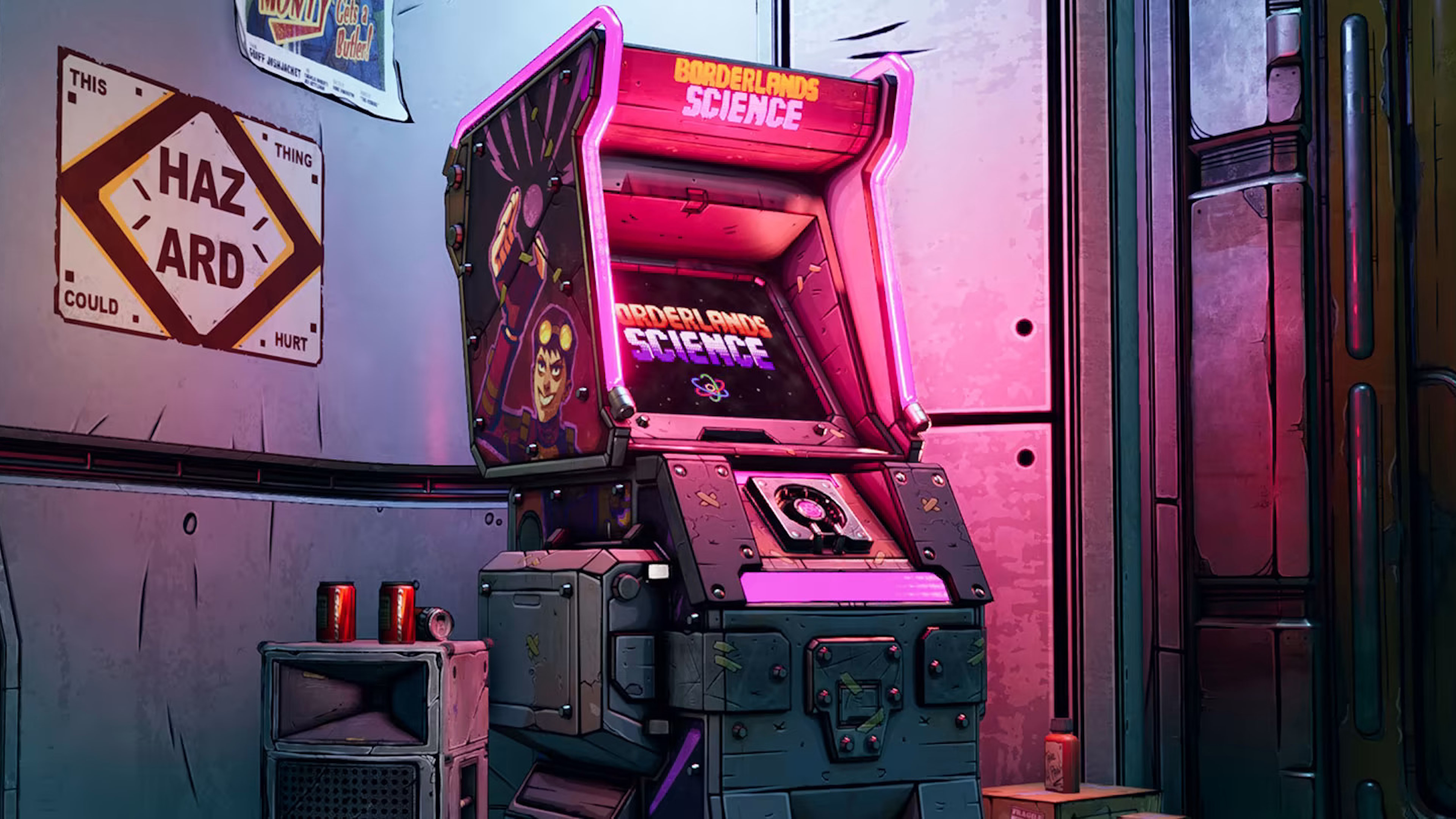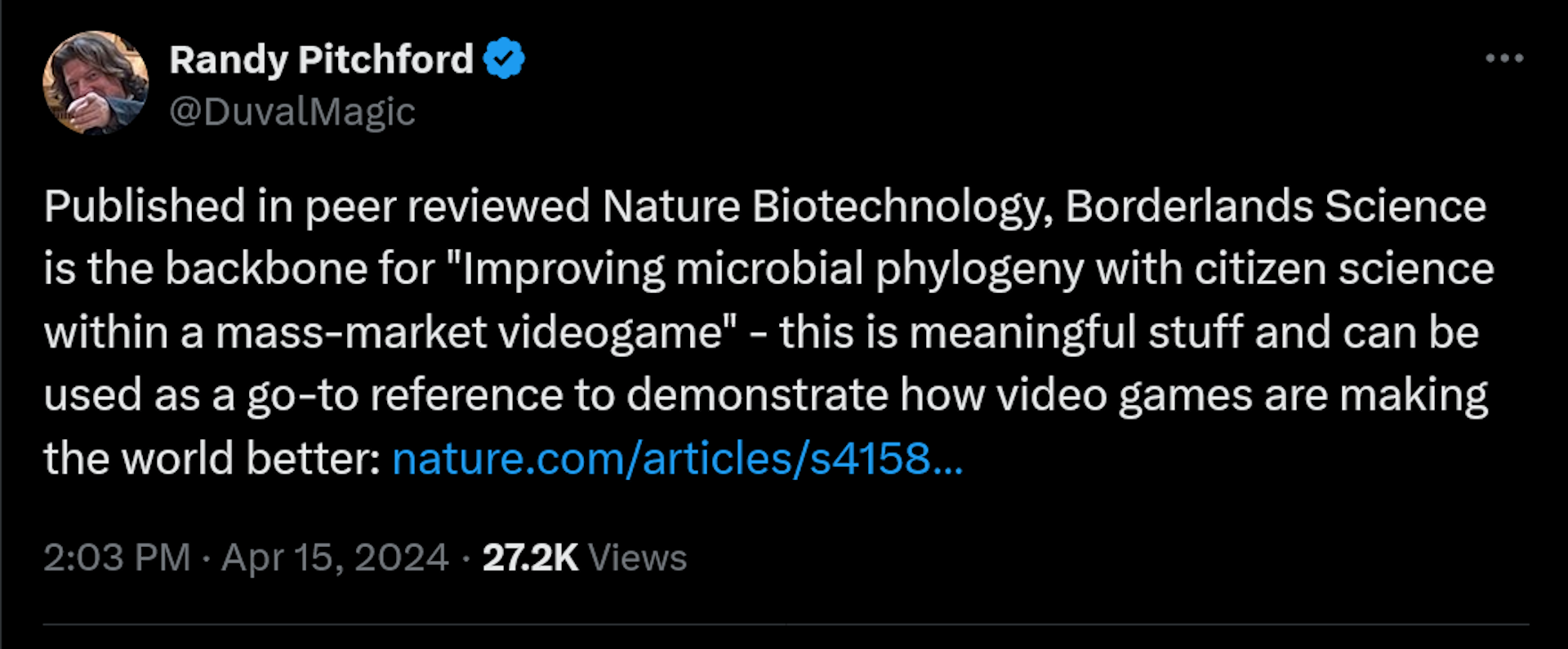Borderlands 3 community scores a big win for science: 'These players have helped trace the evolutionary relationships of more than a million different kinds of bacteria that live in the human gut'
Launched in 2020, the Borderlands Science project was a major success.

When Borderlands Science was announced back in 2020 I thought it all sounded a little silly. Science? In my Borderlands? It struck me as a lot less likely than Dr. Mayim Bialik seemed to think. But it turns out that I was the silly one all along, because McGill University, the institution leading the project, says the project was in fact a massive success that will "substantially advance our knowledge of the microbiome and improve on the AI programs that will be used to carry out this work in future."
Science in Borderlands does not occur through the usual gameplay, but rather by way of the Borderlands Science minigame embedded in Borderlands 3. That's what really drove my doubts about the whole thing. Borderlands is all about shooting endless truckloads of dudes—how many players are going to step away from that to put time into a non-violent minigame?
Roughly 4.5 million of them, as it turns out. "These players have helped trace the evolutionary relationships of more than a million different kinds of bacteria that live in the human gut, some of which play a crucial role in our health," McGill said in a press release. "This information represents an exponential increase in what we have discovered about the microbiome up till now. By aligning rows of tiles which represent the genetic building blocks of different microbes, humans have been able to take on tasks that even the best existing computer algorithms have been unable to solve yet."
With the project now safely concluded, McGill can apparently now admit that it was a little uncertain about the whole thing too.
"We didn’t know whether the players of a popular game like Borderlands 3 would be interested or whether the results would be good enough to improve on what was already known about microbial evolution," said Jérôme Waldispühl, associate professor in McGill’s School of Computer Science and senior author on the study, published today in Nature. "But we’ve been amazed by the results. In half a day, the Borderlands Science players collected five times more data about microbial DNA sequences than our earlier game, Phylo, had collected over a 10-year period."
That's the other interesting part of the study: Borderlands Science demonstrated that citizen science projects like this can have a seriously large reach when they're integrated into games in ways that, to use the scientific term, don't suck. The paper in Nature says a typical "citizen science game" achieving 500,000 players—just a fraction of the number Borderlands Science reached—would be "a massive success," largely because it's hard to convince people to play games specifically in the name of scientific endeavor.
Phylo, for instance, "struggled to retain players for more than a couple puzzles," and had an average of 5.7 tasks completed by users, and a median of two. Borderlands Science players completed an average of 35 tasks, and a median of 12.
Keep up to date with the most important stories and the best deals, as picked by the PC Gamer team.
The downside to that approach is that the increased focus on the "game" part of the project unavoidably dilutes the "science" side. McGill said it "pushed the envelope on gamification" in Borderlands Science and, as expected, the "average scientific contribution" of a single result was significantly lower than in Phylo. But "the ultra-gamification of BLS led to a much higher player engagement and retention than in Phylo, which strongly alleviates that downside."
There were other spinoff benefits to the game-heavy approach as well. McGill said the most common reaction to Borderlands Science from gamers "was enthusiasm and curiosity about science," and while that's admittedly tricky to quantify, the school said it believes the "game-first design" was a major driver of that enthusiasm and engagement.
"Moreover, beyond the optimization of the tradeoff described above, the inherent benefits of participating in a citizen science initiative, such as improvements in science literacy and increased connectedness of the public to the scientific world, further justifies the exploration of the extra gamification region of that tradeoff," McGill said. "Reaching more participants is a valid objective in its own right."

As for what's being done with all the data that's come out of Borderlands Science, Rob Knight of the Departments of Pediatrics, Bioengineering, and Computer Science & Engineering at the University of California San Diego said researchers hope to relate specific types of microbes to diet, aging, and various types of diseases. "Because evolution is a great guide to function, having a better tree relating our microbes to one another gives us a more precise view of what they are doing within and around us," Knight said.
“Here we have 4.5 million people who contributed to science. In a sense, this result is theirs too and they should feel proud about it,” Waldispühl said. "It shows that we can fight the fear or misconceptions that members of the public may have about science and start building communities who work collectively to advance knowledge."
The paper is published, but the Borderlands Science project is still ongoing: A Gearbox representative confirmed that researchers are still collecting data provided by gamers.

Andy has been gaming on PCs from the very beginning, starting as a youngster with text adventures and primitive action games on a cassette-based TRS80. From there he graduated to the glory days of Sierra Online adventures and Microprose sims, ran a local BBS, learned how to build PCs, and developed a longstanding love of RPGs, immersive sims, and shooters. He began writing videogame news in 2007 for The Escapist and somehow managed to avoid getting fired until 2014, when he joined the storied ranks of PC Gamer. He covers all aspects of the industry, from new game announcements and patch notes to legal disputes, Twitch beefs, esports, and Henry Cavill. Lots of Henry Cavill.


